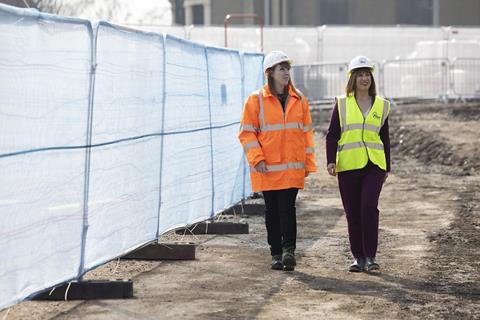Bosses of Landsec, Clarion and Peabody among signatories to BusinessLDN letter to ministers
A coalition of London developers and housing associations have written to the housing minister and the chancellor’s deputy urging them to adopt a “more ambitious” Affordable Homes Programme in Wednesday’s spending review.
The letter, written by BusinessLDN, an advocacy group for business in the capital, also called for a long-term rent settlement encompassing rent convergence, which it described as “an often overlooked but vital intervention” to address the housing crisis.

The bosses of developers Landsec and Ballymore, as well as housing associations Peabody, Notting Hill Genesis and Clarion co-signed the letter, addressed to Matthew Pennycook and Darren Jones.
Rent convergence was introduced by the Labour Government in 2002 to ensure that those living in different types of social housing in the same area paid similar rents, but came to an end in 2015 with many properties still let on rents that were below target.
The letter said the policy meant “fairness for both tenants and providers” and enabled reinvestment by landlords.
The end of convergence meant lost financial capacity for housing associations, which the letter said resulted in them “struggling to fund required improvements to current housing portfolios, let alone deliver new homes”.
>>See also: Warmer homes could save NHS £85m a year, says CIH
>>See also: Seven regional groups of social landlords join forces to call for funding overhaul
Research by the G15 group of London’s largest housing associations has shown that 29% of homes covered by the current rent standard are below where they should be in the context of the local market, which would result in a £2bn hit to the G15’s re-investable income by 2030.
“The re-introduction of rent convergence would not only support direct housing delivery but also help inject billions of pounds worth of fresh activity into local economies, reduce strain on local public finances, and improve prospects for those moving into new homes,” the letter said.
An increase in spending on affordable housing is expected to be included in the Spending Review, although exactly how big it is, and whether it includes rent convergence, remains to be seen.
A settlement for the housing ministry is reportedly yet to be agreed, with Angela Rayner understood to be among a handful of ministers still battling with the Treasury over exactly how much the department needs to achieve the government’s targets.
As well as a boost for the Affordable Homes Programme, there have been calls in the housing sector for a recommitment to retrofit spending and the reclassification of housing as infrastructure.
The latter policy was among the recommendations made by Housing Today and G15’s inaugural State of the Capital report, published in March.
Full list of signatories
Mark Allan, chief executive, Landsec
Mel Barrett, chief executive, Metropolitan Thames Valley Housing
Matt Calladine, main board development director, Fairview New Homes Ltd
John Dickie, chief executive, BusinessLDN
Patrick Franco, chief executive, Notting Hill Genesis
Greg Hill, deputy chief executive, Hill Group
Ian McDermott, chief executive of Peabody and chair of the G15
Clare Miller, chief executive, Clarion Housing Group
Andy Portlock, chief executive, Hadley Property Group
Greg Reed, chief executive, Places for People
Matthew Richards, chief executive, JLL UK & EMEA Capital Markets
Stevan Tennant, managing director development, Ballymore Group








No comments yet